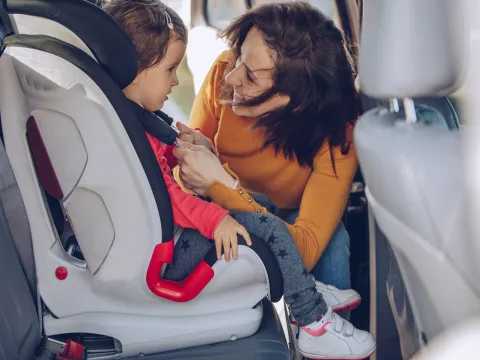- AdventHealth

Every year, dozens of parents go to work or on an errand, their mind on autopilot or distracted, and forget about the most important thing in their life.
An average of 37 children die from vehicular heatstroke each year. In Florida alone, 83 children have died of pediatric vehicular heatstroke since 1998.
Children's thermoregulatory systems do not work as well as adults, says Steve Swearingen, DO, emergency medicine physician at AdventHealth. They can show signs of heatstroke three to five times faster than adults can.
Imagine how you'd feel after sitting in a scorching car for 10 minutes if you could even stand it. That could happen to a child in just a few minutes. Dr. Swearingen was recently filmed and monitored for changing vital signs in a hot car to demonstrate the danger.
The heat doesn't need to be sweltering to be dangerous; children have died in cars with outside temperatures in the 60s. But on hot days, the greenhouse effect created when sunlight passes through car windows can intensify that danger. On a 90-degree day, temperatures inside a car can be fatal for children in just 10 minutes, according to a report from the National Safety Council.
Experts have suggestions to help remind people to check their back seats. There is even an app, The Backseat, that issues a reminder after a car stops.
In a recent report, Safe Kids Worldwide has five recommendations:
- Never leave your child alone in a car, not even for a minute.
- Keep your car locked when you're not in it so kids cant gain access.
- Create reminders by putting something in the back seat next to your child, such as a briefcase, cell phone or your left shoe.
- If you see a child alone in a car, call 911.
- Set a calendar reminder on your electronic device to ensure you dropped your child off at daycare and develop a plan to be alerted if your child is late or a no-show.
In addition to the app, the National Safety Council has highlighted a few technological solutions, including a rear seat reminder on GM vehicles and car seats that remind drivers that a child is in the rear seat after a vehicle is turned off.
Risk factors
Doctors often focus their attention on illnesses for which their patients are at particular risk, like heart disease for someone who is overweight.
It may be tough to see children being left in cars the same way. Your first thought may be that you are not at risk because you aren't the type of person to forget about your child.
However, cases of pediatric vehicular heatstroke deaths tend to have in common a set of factors that have nothing to do with being an attentive parent.
Parents in these cases are often multitasking or distracted. Just as a phone call can lead to crashes on the road even as the perils of distraction are obvious it can also lead parents to forget a child in the car.
Other risk factors include being especially busy or tired, according to the National Safety Council. A change in routine can also be a factor.
Different kinds of mistakes
Not all cases of pediatric vehicular hyperthermia occur when a child is accidentally left in a car.
About 27 percent of kids gained access to a vehicle on their own, and 18 percent died after being knowingly left in a car.
In the first case, locking vehicles can prevent kids from getting in. And kids should also be taught that cars are not safe places to play.
Also, in cases where kids are intentionally left in the car, parents typically intend for it to be brief. However, even with the windows left open, just a few minutes in a hot car can be dangerous.
Florida law prohibits parents from leaving children unsupervised in a car for more than 15 minutes and for any time when the health of the child is in danger. But, again, there is really no safe amount of time for a child to be left unsupervised in a vehicle.
If you see a child suffering from hyperthermia, Dr. Swearingen says to remove the child from the car, call 911 and, if possible, get the child into shade. If you can, try to cool his or her body, especially at the armpit, groin, neck and lower back.
Taking simple steps to set up a reminder can pay off in the long run. These precautions can give you a little peace of mind that you're doing your part to prevent any more of these tragedies.
For more information about how AdventHealth for Children can help your family stay safe this summer and beyond, visit our website or call Call386-231-1400.



